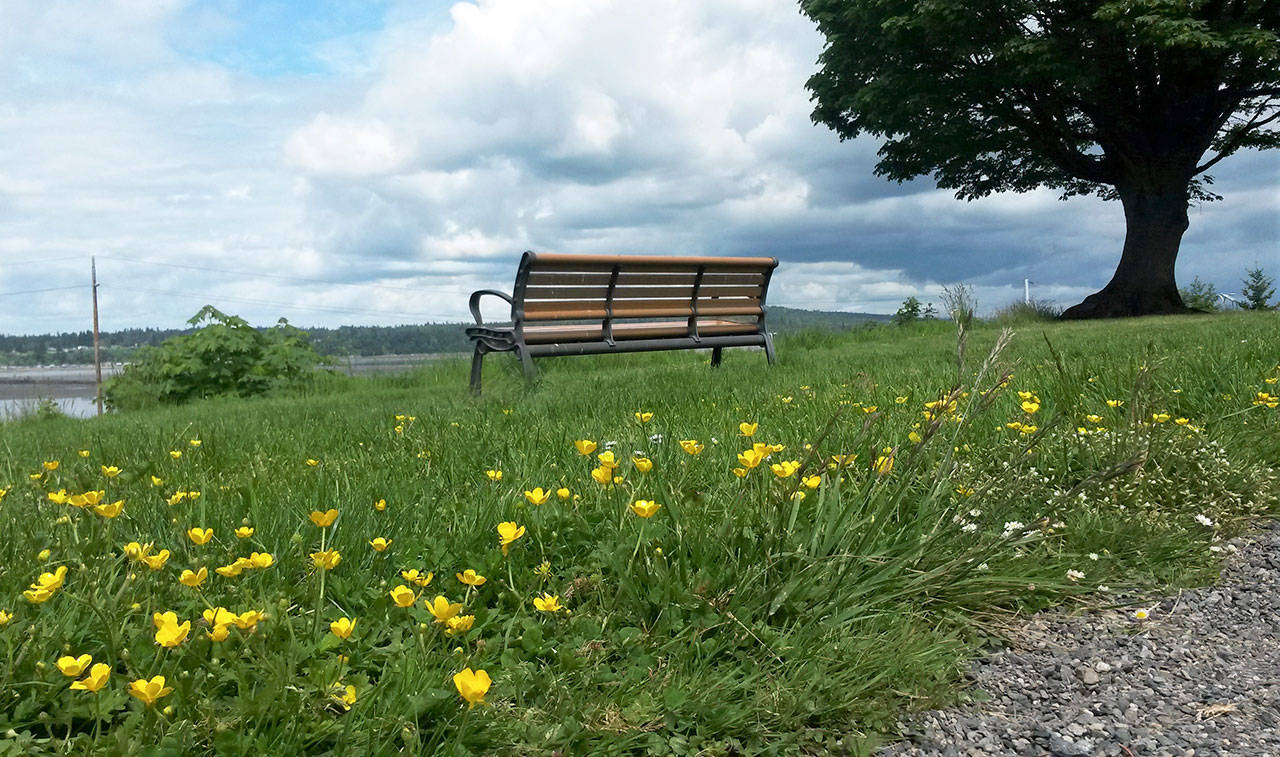EVERETT — Looking north from the tops of some buildings downtown, the bay and land of Tulalip are visible.
But the Tulalip Tribes’ ancestors lived throughout Everett and other parts of Western Washington.
A sduhubš (Anglicized as Snohomish) village called Hibulb once existed along Port Gardner and the mouth of the Snohomish River in Everett. It is memorialized at Legion Memorial Park as the Hibulb Lookout.
The historic connections between Everett and native inhabitants could be further tied by a tribal-land acknowledgement resolution the Everett City Council approved Wednesday by a 6-0 vote. Everett is just the second city in Snohomish County and one of a small but growing list in the state to have made such a statement.
“It’s great for the city to be doing this,” said Ryan Miller, Tulalip Tribes director of treaty rights and government affairs. “I hope folks will take a look at the history of tribes in the place that they live and think about what sacrifices were made, and think about what they can do to uphold those guarantees made in the treaty.”
The Tulalip Tribes’ ancestors lived in what is now Snohomish County long before European and American colonists settled in the area. In 1855, many tribes of Western Washington, including the Tulalip Tribes, and Gov. Isaac Stevens signed the Point Elliot Treaty in Mukilteo. Through it, tribal people ceded millions of acres of land in exchange for the rights to fish and hunt, education and more.
But Congress didn’t ratify the treaty for another four years and provisions such as food and money from the U.S. were slow to reach Native Americans at their reservation.
The treaty established the relationship between the United States and tribal governments and remains the framework today.
Last year, Everett’s Diversity Advisory Board of volunteers, appointed by the mayor and council, began working with Miller on the tribal-land acknowledgement resolution. Miller said the approved version is mostly what he wrote on behalf of the Tulalip Tribes. It will be read and included in every Everett City Council agenda and meeting.
“We acknowledge the original inhabitants of this place, the sduhubš people and their successors, the Tulalip Tribes,” Everett’s tribal land acknowledgement reads. “Since time immemorial, they have hunted, fished, gathered on, and taken care of these lands and waters. We respect their sovereignty, their right to self-determination and honor their sacred spiritual connection with the land and water. We will strive to be honest about our past mistakes and bring about a future that includes their people, stories, and voices to form a more just and equitable society.”
It’s almost identical — the final sentence being a notable exception — to what Edmonds adopted in 2019. When the Edmonds City Council approved its statement, it was believed to be the first in Washington.
The last sentence in Everett’s statement is intended to spur action through curiosity and reflection, Miller said. He gave more interpretive signs about sduhubš history at Hibulb Lookout as an example.
“It is important to show that we as a city and as a council understand our history and acknowledge the fact that we have a long, troubling history,” Everett City Council member Liz Vogeli said. “This is one small step in doing that.”
Miller has worked on or reviewed at least 10 tribal land acknowledgements this year, he said. That includes the one for Seattle’s National Hockey League team, the Kraken.
The statements are published and sometimes read regularly, and they’ve become increasingly common.
The U.S. Department of Arts and Culture, a grassroots organization (and not a department of the federal government), popularized the concept. Miller said efforts to protect land and water from gas pipelines gave Native American issues national attention, starting with recognizing the historic role indigenous people had in North America.
Other governments have since followed, including Spokane and Tukwila earlier this year.
Organizations near Everett have similar statements, including the Edmonds and Mukilteo school districts, Edmonds College, Everett Community College, the United Way of Snohomish County, the University of Washington and Washington State University.
Cascade View Elementary School in Snohomish has a native land acknowledgement.
The Snohomish County Council approved a tribal land acknowledgement, first proposed by Councilmember Megan Dunn, as well this year. Beginning in September, it will be read at the start of the council meeting on the second Wednesday every month.
“I think land acknowledgements are a powerful way to show respect and honor the people of the land that we live on and work on,” Dunn said.
Miller also worked on an Everett resolution that recognizes the second Monday of October as Indigenous Peoples’ Day, first proposed by Councilmember Vogeli. The resolution was approved 6-0, though the holiday will not be a paid day off for city staff.
All of these resolutions work with tribally developed curriculum in all schools that came from legislation by former longtime state Sen. John McCoy, a Tulalip Tribes member, Miller said.
“I hope that land acknowledgements are the first step in education,” he said.
Ben Watanabe: bwatanabe@heraldnet.com; 425-339-3037; Twitter @benwatanabe.
Talk to us
> Give us your news tips.
> Send us a letter to the editor.
> More Herald contact information.

























